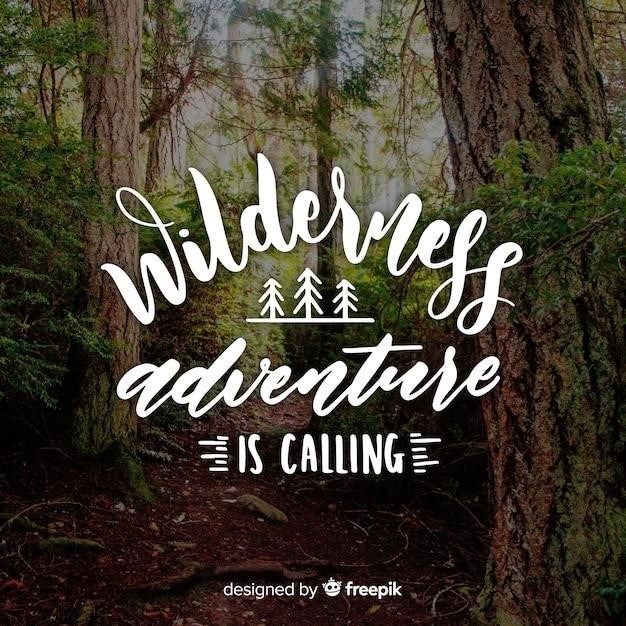Into the Wild⁚ A Plan for an Article
This article will explore the captivating story of Chris McCandless, a young man who renounced his privileged life to embark on a solitary journey into the Alaskan wilderness, as documented in Jon Krakauer’s compelling book, “Into the Wild.” We will delve into McCandless’s motivations, the challenges he faced, and the enduring impact his story has had on readers and viewers alike.

The Story of Chris McCandless
Chris McCandless, the protagonist of Jon Krakauer’s “Into the Wild,” was a young man who, after graduating from Emory University in 1991, chose to abandon his comfortable life and embark on a journey of self-discovery. He shed his identity, adopting the name “Alexander Supertramp” and rejecting his family and possessions. McCandless’s journey took him across the American West, where he lived a nomadic existence, relying on his wits and the kindness of strangers. He hitchhiked, worked odd jobs, and embraced a life of simplicity and freedom. His ultimate destination was the Alaskan wilderness, where he sought to live off the land, free from the constraints of civilization.

McCandless’s Journey into the Alaskan Wilderness
In April 1992, McCandless, driven by a profound desire for self-reliance and a yearning for a life untouched by societal norms, arrived in Alaska. He abandoned his car and ventured into the remote Alaskan wilderness, seeking a solitary existence. He chose a location near the Stampede Trail, a rugged and unforgiving area accessible only by foot or air. McCandless’s journey was fraught with challenges. He encountered harsh weather conditions, struggled to find sustenance, and faced the isolation of living alone in the vast and unforgiving wilderness. He relied on his limited knowledge of survival skills and his resourcefulness, but ultimately, the harsh realities of the Alaskan wilderness proved too formidable for him.
The Inspiration for Into the Wild
Krakauer’s fascination with McCandless’s story stemmed from a personal connection to the young man’s journey. In his own youth, Krakauer had been drawn to the allure of adventure and the wilderness, and he saw a reflection of his own past in McCandless’s quest for self-discovery. The book’s title, “Into the Wild,” reflects the allure of the unknown and the desire for a life untainted by the constraints of civilization. McCandless’s story resonates with readers because it taps into a universal human desire for freedom, self-reliance, and a connection with nature. Krakauer’s exploration of McCandless’s journey, while initially rooted in his own personal experiences, ultimately evolved into a broader examination of the human spirit, the allure of the wilderness, and the complexities of societal expectations.
Jon Krakauer’s Involvement
Jon Krakauer, a renowned author and mountain climber, became deeply engrossed in the story of Chris McCandless after reading a brief article about him in the magazine “Outside.” Intrigued by McCandless’s unconventional journey and the mystery surrounding his death, Krakauer decided to delve deeper into the young man’s life. He meticulously researched McCandless’s past, tracing his steps through interviews with family, friends, and individuals who encountered him along the way. Krakauer’s investigation led him to Alaska, where he retraced McCandless’s final journey, immersing himself in the harsh environment that had ultimately claimed the young man’s life. Through his extensive research and firsthand experience, Krakauer sought to understand McCandless’s motivations, his strengths, and the factors that contributed to his tragic demise.
Krakauer’s Writing Style
Jon Krakauer’s writing style in “Into the Wild” is a captivating blend of narrative storytelling, investigative journalism, and introspective reflection. He masterfully weaves together factual accounts of McCandless’s journey with his own personal experiences and observations, creating a multi-layered narrative that engages both the mind and the emotions. Krakauer’s prose is vivid and descriptive, bringing to life the Alaskan wilderness and the challenges McCandless faced. He uses a combination of dialogue, anecdotes, and personal reflections to paint a compelling portrait of Chris McCandless as a complex and enigmatic figure. Krakauer’s writing style is characterized by its honesty, its willingness to explore difficult questions, and its ability to connect with readers on an emotional level. He avoids sensationalism and instead presents a nuanced and insightful account of McCandless’s life and death, leaving readers to form their own conclusions.
Themes Explored in Into the Wild
Jon Krakauer’s “Into the Wild” delves into a multitude of profound themes that resonate with readers on a personal and philosophical level. The book explores the complexities of human nature, the search for meaning and purpose, the allure and dangers of wilderness, and the enduring power of individual freedom. McCandless’s journey becomes a metaphor for the universal human desire to break free from societal constraints and embrace a life of authenticity and self-discovery. Krakauer’s narrative raises questions about the nature of happiness, the value of material possessions, and the role of family and community in shaping our identities. The book also examines the allure of the wilderness as a place of both beauty and danger, and the delicate balance between seeking solitude and the need for human connection. Ultimately, “Into the Wild” is a powerful meditation on the human condition, prompting readers to reflect on their own values, aspirations, and the choices they make in navigating life’s complex terrain.
Critical Reception of Into the Wild
Upon its release, “Into the Wild” garnered widespread critical acclaim, solidifying its place as a literary and cultural phenomenon. Critics praised Krakauer’s masterful storytelling, his ability to blend factual reporting with insightful analysis, and his evocative prose that transported readers to the heart of the Alaskan wilderness. The book was widely lauded for its exploration of complex themes, its compelling portrayal of Chris McCandless’s journey, and its thought-provoking reflections on human nature and the search for meaning. Some critics, however, voiced reservations, questioning McCandless’s motivations and the ethical implications of his actions. They argued that his reckless pursuit of self-reliance and his disregard for safety put his life, and those who attempted to help him, at risk. Despite these dissenting voices, “Into the Wild” has endured as a powerful and enduring work of non-fiction, sparking countless discussions, debates, and interpretations, and solidifying its position as a cornerstone of contemporary literature.
The Legacy of Chris McCandless
Chris McCandless’s story, as recounted in “Into the Wild,” has left an undeniable mark on popular culture and continues to resonate with readers and viewers decades after his death. McCandless’s yearning for freedom, his rejection of materialism, and his pursuit of a life lived on his own terms have inspired countless individuals to question societal norms and embrace a more authentic existence. His story has sparked countless discussions about the meaning of life, the pursuit of happiness, and the complexities of human relationships. While some have criticized McCandless’s choices, seeing them as reckless and irresponsible, others view him as a symbol of rebellion against the constraints of modern society, a testament to the enduring human desire for adventure and self-discovery. Whether seen as a tragic hero or a cautionary tale, Chris McCandless’s legacy remains a potent reminder of the enduring power of the human spirit and the unwavering search for meaning in a world often defined by its own limitations.
Adaptations of Into the Wild
The captivating narrative of Chris McCandless’s journey into the Alaskan wilderness has transcended the pages of Jon Krakauer’s book, “Into the Wild,” inspiring numerous adaptations across various mediums. In 2007, Sean Penn directed a critically acclaimed film adaptation, starring Emile Hirsch as McCandless. The film, which faithfully captures the essence of Krakauer’s writing, delves into the complexities of McCandless’s motivations, his relationship with his family, and the allure of the wild. “Into the Wild” has also been adapted for the stage, with several theatrical productions exploring the themes of freedom, isolation, and the search for meaning. Notably, a stage adaptation by the renowned playwright, Tim McIntire, has been performed to critical acclaim. These adaptations, in their diverse forms, have contributed to the lasting cultural impact of “Into the Wild,” ensuring that Chris McCandless’s story continues to captivate and inspire audiences around the world.
The Impact of Into the Wild
Jon Krakauer’s “Into the Wild” has had a profound and enduring impact on readers, sparking conversations about personal freedom, the allure of nature, and the complexities of human relationships. The book has inspired countless individuals to embrace their own journeys of self-discovery, prompting some to embark on adventures in the wilderness, while others find solace in the exploration of their own inner landscapes. The story has also served as a catalyst for discussions about the dangers of romanticizing the wild, highlighting the importance of preparation and respect for the power of nature. Additionally, “Into the Wild” has fostered a renewed appreciation for the work of Jon Krakauer, cementing his reputation as a master storyteller and a profound observer of the human condition. The book’s enduring popularity, evident in its continued presence on bestseller lists and its adaptation into various media, underscores its timeless appeal and the power of a compelling narrative to touch the hearts and minds of readers across generations.
Jon Krakauer’s “Into the Wild” remains a powerful and thought-provoking chronicle of Chris McCandless’s extraordinary journey into the Alaskan wilderness. Through Krakauer’s masterful storytelling, the book transcends the boundaries of a simple adventure tale, delving into profound themes of self-discovery, human connection, and the complex relationship between man and nature. The book’s lasting impact lies in its ability to spark introspection and inspire readers to confront their own values, aspirations, and the choices they make in life. Whether one agrees with McCandless’s actions or not, “Into the Wild” serves as a poignant reminder of the human desire for freedom, the allure of the unknown, and the enduring power of a story well told.


